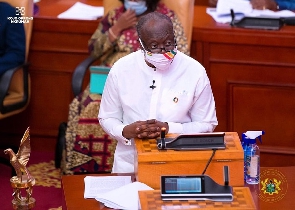 Ken Ofori-Atta, Minister for Finance
Ken Ofori-Atta, Minister for Finance
Cenpower Generation Company Limited (Cenpower) has committed to switching its primary fuel from light crude oil (LCO) to natural gas and signed a gas supply agreement (GSA) with the Ghana National Petroleum Corporation (GNPC).
Gas operations are expected to begin by the end of this week.
A statement issued by the Public Relations Unit of the Ministry of Finance said the government welcomed the significant milestone and commitment from Cenpower.
The GSA is a key part of the proposal put forward by Government during negotiations with Cenpower and will deliver substantial cost savings, estimated at $3.0 billion over the remaining term of the Cenpower PPA.
Furthermore, conversion to natural gas will have important environmental benefits, as emissions will be lowered and Ghana’s abundant natural gas resources effectively utilised for the benefit of the Ghanaians and the business community.
Additionally, the move to natural gas will alleviate the considerable pressure on Government from its take-or-pay commitments with fuel suppliers and allow for the substitution of imported fuels with locally available natural gas, thus positively impacting the capital account, the statement said.
The statement quoted Minister for Finance, Ken Ofori-Atta as saying; “We welcome Cenpower’s commitment to Ghana and recognize Cenpower’s conversion to gas as a significant step in helping regenerate Ghana’s energy sector.”
In recent weeks, there has been increased momentum under the ESRP Consultation Process towards resolving some challenging legacy issues inherited from the previous administration, he said.
“We encourage all other IPPs to engage constructively with the Government negotiating team to conclude negotiations as soon as possible. IPPs have a vested interest and a significant role to play in providing a stable energy supply as well as ensuring a fair, balanced and sustainable energy sector for the people of Ghana.
As ever, this Government is committed to building a competitive and dynamic energy sector, where private investments can thrive and the interests of the Ghanaian people and businesses continue to flourish.”
Cenpower is a major power producer in Ghana, providing approximately 10% of Ghana’s total electricity generation. This project is an excellent example of the public and private sectors working together in Ghana to attract private investment while ensuring sustainable development.
Presently, Ghana pays over US$500 million a year for unused electricity. Most of the power PPAs are legacy agreements, entered into under the previous administration.
The Government, in collaboration with the World Bank, established the Energy Sector Recovery Programme (ESRP), identifying the policies and actions needed for financial recovery in the energy sector over a five-year horizon (2019-2023).
As part of these reforms, the Government is taking steps to institute competitive bidding for future additional capacity, to ensure that future tariffs are fair and in line with expected pricing benchmarks.
The statement said the government has demonstrated its commitment to the ESRP by actively developing whole-of-sector initiatives and reforms, including implementation of the Cash Waterfall Mechanism (CWM) in April 2020, which allows tariff revenues of the Electricity Company of Ghana (ECG) to be distributed more transparently.
As well, the Government is managing the payment of energy sector arrears, despite the challenging fiscal situation, which has been exacerbated by the COVID-19 pandemic.
The statement said the Government negotiating team, established under the Energy Sector Recovery Task Force (ESRTF), which is helmed by the Senior Minister, is working bilaterally with independent power producers (IPPs) and gas suppliers (GSs) under the ESRP Consultation Process, to secure more favourable agreements for both parties and achieve a balanced energy sector capable of delivering fair, long-term energy partnerships and solutions.
It said the government had undertaken the discussions in good faith and urged all IPPs to work closely with the negotiating team to conclude negotiations as soon as possible.
In September, the government successfully secured terms for an amended PPA with CENIT Power Limited.
As part of the ESRP Consultation Process, Government has also directly engaged IPP lenders in negotiations, offering to refinance outstanding facilities at a discount through a designated Energy Fund.
Clearly, lenders have a crucial role to play in alleviating the debilitating financial strain on Government – arising from the onerous and unbalanced legacy energy sector contracts – by renegotiating on terms that provide significant tariff reductions.
Globally, financial institutions are having to reconsider their positions in light of the impact of the COVID-19 pandemic and its devastating impact on national economies, including triggering defaults and credit downgrades.
Government urges lenders to take a sensible and pragmatic approach and urgently consider the refinancing proposals to conclude negotiations as quickly as possible, the statement added.